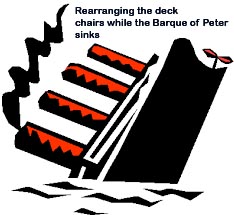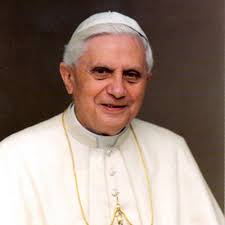Aidan Hart challenges the lack of effective response to the various crises in today’s Catholic Church
The old adage in the title of this article, used by Benjamin Franklin, could not be more apt than it is today, to describe the absence of effective response by the Vatican and Irish hierarchy – among many other hierarchies – to the current crisis and confusion in the Catholic Church.
This crisis includes:
- a serious drop in church attendance and Church membership;
- the closure or amalgamation of parishes due to the ever increasing shortage of priests;
- with younger generations absent from church, confusion about the purpose and effectiveness of Catholic schools in the task of faith-formation of young Catholics;
- the long-standing battle over whether or not the Second Vatican Council was an appropriate, Spirit guided, reform of the Catholic Church – or whether it went too far and now needs to be re-reformed back to where the Church was before it took place.
Eucharistic crisis
To begin with this last issue, groups in various parts of the world are now increasingly asking for Mass to be celebrated once again in Latin, a situation encouraged and made easier by Pope Benedict XV1’s apostolic letter Summorum Pontificum. Supporters of the Latin Mass argue that Mass in the vernacular has lost its essential sense of mystery, awe and worship.
Those against a return to Mass in Latin want full implementation of what Vatican II deemed essential – ‘full, conscious and active participation by the laity’. They also want further reforms to emphasise Eucharist as a transformative and sacred meal, full of joyful and worshipful praise, in which all participate. They want participants to leave Sunday Mass more fully united as a community in Jesus the Christ, strengthened and encouraged to make Christ and his unconditional love present to all those they encounter. They feel that Mass has become a privatised and individualistic devotion rather than sacred food for the task of forming mutually supportive and evangelising communities.
And those in the English-speaking world want the current and awkward Latinised English of the recent translation of the missal to be retranslated into an English which is easily read and meaningful.
Faith formation failing
As for faith formation of the young, reformers want parents to take back the crucial task of being the primary and most important formators by their words and actions – supported by parish and diocesan training programmes.
At present there is serious danger of squandering the huge investment of both money and human resources in Catholic primary and secondary education over a very long period of time. During that time Catholic parents have been under considerable pressure from their local clergy to have their children attend Catholic schools in order to learn about their faith and become Sunday Mass-attending Catholics for life. “ Irish Catholic young people are among the most catechised and least evangelised in Europe…With the exception of Catholic Schools Week, the Irish religious education establishment is fixated on questions of ownership and management and too little on the purpose of the Catholic school and the outcomes of Catholic education in terms of faith formation. (Most Rev. Diarmuid Martin, Archbishop of Dublin in his Saint Kilian’s Lecture in Germany 8th July 2017) An accurate and honest critique of what is wrong but nothing in the speech to suggest or recommend what should be put in its place. It is both surprising and shocking that no professional research has ever been carried out and published in Ireland and in most other countries as to the effectiveness or otherwise of leaving the formation of faith solely to Catholic schools. The fact that the sacrament of Confirmation has for quite some time been regarded by many clergy as the Sacrament of Exit from the Church would indicate that Catholic schools cannot, on their own, effectively form the faith of young people in a way that will grow and develop throughout their adult lives. The Spring 2017 edition of The Sheaf (St. Joseph’s Young Priests Society) reports recent studies showing that about 80% of those who leave the Catholic Church have done so by the age of 23.
(See the article ‘Faith Formation and Fear of Shame’ by Sean O’Conaill, first published recently in The Furrow and now hosted on this website.)
A disappearing priesthood?
 Why has so little been done in the past – and why is so little still being done at present – to tackle the crisis which is now upon us in the Catholic Church? Closing, clustering or amalgamating parishes when priests are no longer available is far too little too late – a rearranging of the deckchairs on a sinking ship! The organisation of endless talking shops which are ‘doomed to success’ by discussing a very restricted agenda of non controversial issues and ineffective solutions is mostly a pretence at involvement of the laity and at effective action.
Why has so little been done in the past – and why is so little still being done at present – to tackle the crisis which is now upon us in the Catholic Church? Closing, clustering or amalgamating parishes when priests are no longer available is far too little too late – a rearranging of the deckchairs on a sinking ship! The organisation of endless talking shops which are ‘doomed to success’ by discussing a very restricted agenda of non controversial issues and ineffective solutions is mostly a pretence at involvement of the laity and at effective action.
An example of a solution which fails to solve the underlying problem but merely covers it with a sticking plaster is the ordaining of permanent male deacons to do what mostly any baptised Catholic lay man or woman can already do by virtue of their baptism (Cf. Canon 1112 of Code of Canon Law 1983). Making lay men permanent clerics and dressing them in black suits and Roman collars are part of the deception that effective action is being taken and all is well for the future. The original role of deacon in the New Testament is now filled successfully by the local members of the St. Vincent de Paul Society. The transformation of this office into a totally new semi-liturgical role – which does not require a cleric – fails to solve the problem of the severe lack of vocations to the priesthood as currently constituted. Permanent deacons may alleviate somewhat the near exhaustion and feeling of isolation of the rapidly dwindling number of parish clergy but at the high cost of Sunday Mass no longer being available locally to a greater number of Catholics who will no longer be known by their local priest.
Between 2004 and 2014 the number of Irish diocesan priests declined by more than 500. At least 8 Irish priests have fallen victim to suicide in the last 10 years as morale continues to decline and mental health issues increase. As Fr. Gerry Moloney CSSR wrote about priests in 2012, when the shortage was already well under way, non-resident clergy serving amalgamated parishes “will become little more than sacrament dispensers, going from one parish or church to another, with little or no time to get to know people or to be with them.” (‘A Look at a Priest’s Life’ The Furrow, January 2012)
Comprehensive and radical thinking and discussion of all options by clergy and laity into all these issues seem abhorrent to most members of our hierarchy, which can seemingly be the only reason they avoid it. Pope Francis has frequently asked local bishops to come up with concrete, effective proposals but to little avail. One could almost say the lack of effective action in the current crisis by our hierarchical leaders is a sin against the Holy Spirit as they seem to be wrongly awaiting the Spirit to do what they lack the vision, commitment and courage to do themselves. Even a casual reading of the Old Testament should disabuse them of that response.
Emergency response is lacking
A country facing an impending disaster, such as widespread famine or flooding, or a business facing impending bankruptcy, would urgently commission expert reports and consult all agencies and people concerned, irrespective of gender and status. In a failing business, management and staff (men and women) at all levels would work closely together to identify the causes and all possible solutions to their existential crisis. The identification of problems would be honest and rigorous. No suggestion would be ‘off the table’. People would realise that the future of their sinking company was in all their hands. A close partnership based on trust and shared responsibility, with everyone’s skills and contributions being encouraged and respected would be the order of the day. A strong sense of urgency would prevail, knowing that time was of the essence.
Why then does our Irish hierarchy, and the Vatican itself, seem to feel that such an urgent and comprehensive response to the current crisis in the Irish and universal Church is totally irrelevant, inappropriate or unnecessary? Could it be that the admission of a crisis and particularly the admission of the hierarchy’s and Vatican’s part in helping to bring about that crisis, is beyond the capability of most members of the hierarchy and Vatican? After all, most seem to have been appointed for being ‘a safe pair of hands’ rather than for their inspired thinking, strong and proven leadership skills and team work. Do they see themselves as above blame? Are they too ashamed or are they afraid of losing their current power and status?
Why must the church ‘become small’?
Pope Benedict’s forecasting as far back as 2009 of the Catholic Church getting smaller has a strong ring of complacency and defeatism about it, and an attitude of the decline having nothing to do with Rome or the hierarchy; “The church will become small and will have to start afresh more or less from the beginning…but she will enjoy a fresh blossoming and be seen as man’s home, where he will find life and hope beyond death.” (‘Faith and the Future’ 2009). There is no acceptance in the book of the author’s complicity in helping to bringing about the present crisis. This he did by being silent publicly over clerical paedophilia and arguably thus covering it up. As Cardinal, he was in charge of the Congregation for the Doctrine of the Faith (CDF) and responsible for investigating and taking effective action on such matters. He failed to do so, as protecting the good name of the Church was deemed to be more important than protecting children from sexual abuse. Parents’ letters to the Vatican about their children being sexually molested by a priest were left unanswered.
Nor is there acceptance in that papal book of the Vatican’s institutional complicity in causing additional decline by its long-standing failure to take effective action to stop the Vatican bank’s money laundering activities for dubious organisations and individuals, and its refusal to publish full and independently audited accounts. In a Church rapidly declining in both membership and influence, where will men and women find what Emeritus Pope Benedict XVI called “home where (they) will find life and hope beyond death” during his predicted centuries of decline and absence of Eucharist? Who will ‘feed my lambs and feed my sheep’ (John 21:15-17)?
Many will see the declining Church, not as a place of “life and hope”, but rather as the sinful organisation that covered up terrible crimes against children by many of its male clerics and female religious in many parts of the world – the latter in their running of orphanages and homes for unmarried pregnant women.
It will also be seen as contradictory for a Church to have put Eucharist at its centre and yet to have denied that same Eucharist to many of its adherents around the world through its insistence on a seriously declining all-male and celibate priesthood. That situation, in effect, puts male priestly celibacy at the centre of the Church and not Eucharist.
Pope’s Francis’ statement to EU leaders in March 2017 could be equally applied to the crisis and turmoil currently within his own Church; “When a body loses its sense of direction and is no longer able to look ahead it experiences a regression and, in the long run, risks dying.” Does that not say it all?
Over-centralisation
We are now paying the price of all power being over-centralised for centuries in the Vatican and failing to be open and accountable to its lay members. The Second Vatican Council agreed on the decentralisation of much of the power to local bishops, which had been the more ancient Tradition. However, the ‘old guard’ in the Vatican, supported by two post-Council Popes, dragged their feet and reform quickly petered out. Some of the reforms of the Second Vatican Council, particularly liturgical reforms, are now seen by some cardinals, bishops and priests as needing to be reformed back again to the situation before the Second Vatican Council. (This is known as ‘the reform of the reform’.) The failure to implement the totality of the Second Vatican Council, both in spirit and letter, has helped create the disillusionment of many Catholics, both lay and clerical, and helped perpetuate the clericalism denounced by Pope Francis. Clericalism has perpetuated careerism within the clerical ranks of the Church, and particularly, according to Pope Francis, within the Vatican itself, and is underpinning the practice of clerical promotion still being too often based on ‘a safe pair of hands’ rather than on depth of spirituality, strength of commitment to apostolic endeavour, proven skills in team-work, a history of responding adequately to necessary change (particularly those envisaged by the Second Vatican Council), humility and poverty of lifestyle. The ‘order of the day’ has for too long been ‘better to do nothing than to be seen making a mistake and blotting one’s copy book or offending those in power in the Vatican, thus endangering one’s chances of future promotion to the rank of bishop, archbishop or cardinal’ .
Tinkering at the edges will no longer work. Being dishonestly positive by refusing to admit that there really is a deep-seated crisis in both the Irish and universal Church is irresponsible. It will only accelerate and deepen the crisis further. What is required is a complete paradigm shift in Catholic ecclesial theology, moral theology, Canon Law, liturgy (particularly Eucharistic liturgy), the role of laity, the requirements for priesthood and new, open and accountable structures for Vatican /diocesan and parish governance. Root and branch reform is required, not a mere tinkering at the edges.
Another schism pending?
The inadequate response of the hierarchy, and particularly of the Vatican, to the major problems and scandals in the 16th century Catholic Church (e.g. the sale of indulgences), highlighted by Father Martin Luther O.S.A. in Germany, led to the splintering of the Catholic Church into various Protestant Churches. The Council of Trent (1545 – 1563) introduced some necessary reforms (and a lot of rigidity) but it was a case of too little too late. That schism within the Christian Church remains to this day.
Are we not again seeing that lack of adequate and effective response to major problems in today’s Catholic Church, perhaps leading to another schism, this time much larger than that brought about by Archbishop Lefevbre in 1970 by the founding of the schismatic Society of Saint Pius X (SSPX) to oppose the reforms of the Second Vatican Council. It has to be accepted, of course, that further reforms might themselves cause further schisms by those ultra-conservative members of the Vatican and world-wide hierarchy, hence the cautious progress of Pope Francis.
Vatican III?
Could the answer be a Third Vatican Council? If so, one hopes it will have a more inclusive structure, with both a House of Representative clergy (of Cardinals, Bishops and priests) and a House of Representative Laity (men and women), all with courage, honesty and integrity putting forward proposals and discussing and deciding upon the recommendations of expertly researched and publicly available reports? This might free the way for the Holy Spirit, dwelling within all of the People of God, to plan with us and through us for a more fruitful future in making the Kingdom of God more effectively present in our midst and available to all of human kind. It would enrich and evangelise the whole of society with God’s life-affirming, unconditional love and mercy. It would make progress in spite of the fears, weakness and sins of humanity, both clerical and lay, which will always be with us. However, cooperation with God’s ever abundant grace in taking effective and timely action will always help us overcome the obstacles to progress in spreading the Kingdom of God on earth, His Kingdom of love, mercy and justice to all.
May all the People of God, clergy and laity alike, have the humility and wisdom of the young King Solomon to ask God for His gift of discernment in guiding His Church in all things, particularly in the long process of structural, theological and spiritual renewal. (Cf. 1Kings 3:5-12)

